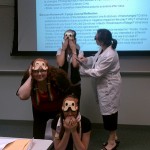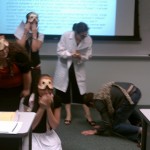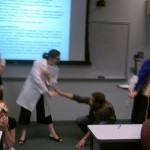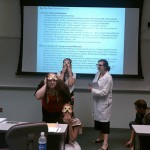I am already embarrassed. First, I super regret noting my interest in “reflective/reflexive writing” assignments in last week’s blog. I meant assignments to assign not to perform. This leads to one of the underlying currents in my blog: my issues interacting with this material as student and teacher. I always relate our class material to how it compares to my own education. Sometimes I am successfully able to focus on how to teach with/through/for, but too often I get stuck in a compare/contrast to how I did or did not experience these new pedagogies of critical, reflexive reading. My status as not-yet-teacher forces doubt to every “How would this work?” moment because I end up overwhelming myself with a “How would anything work?” Most of the time I am blinded or stymied by my naivety: in my imaginary classroom everything I would have liked as a student will work. (My over-enthusiasm and gullible acceptance of most presented approaches in probably more harmful to my developing pedagogical methods, in the long run.) I repeatedly return to my experience as a student, which honestly can only get me so far while wrestling with the material.
Each week I pour over everyone’s writing to primarily digest what everyone thought about the reading and, due to a terrible comparison compulsion, to secretly reconfirm my own blog’s lack of belonging in this smart collaborative website. Already I dread this self-reflexive exploration dragging down the academic excellence of sample reality. I struggled with how write at least 300 words of profound self-analysis when only one descriptive adjective comes to mind: lame. Starting in week four I decided to keep my blogs as close to 300 words as possible because I realized how quickly these readings add up and I didn’t want anyone to waste their time with mine. Unfortunately, that comment is not actually based on analysis, but mere memory of intention during composition. I have already guiltily broken this self-imposed limit, but maybe its okay if I can accomplish the deep engagement with material I desire.
I was also hoping that limiting my word count would force me to leave out lame personal anecdotes. Wrong. I tell dumb stories. Not just in this blog. I consistently catch myself in the middle of boring stories which only mildly relate to the present topic and this sentence is a perfect example. Instead I should encourage the deeper connections of material I found myself missing: when I discussed projective identities I did not even mention Salvatori and Donahue’s treatment of repertoire and identify. My focus on identities of learners and their responsibility as learners is a theme I should be proud of and develop. I have got to cut all the superficial doo-doo just because I am self-conscious of the lack of authority in my teacher-voice. This is also why I stopped commenting on others’ blogs, but now I’ll just ask a little forgiveness when I say something stupid and really take advantage of this awesome collaboration of authorship. Or at least try to. Why does this blog throw me for such a writing loop?
I will be honest, when engaging Blau and Gee’s material I didn’t know what else to add to the conversation. My need to try for either some originality or to build on previous conversations hindered my engaged handling the material in composition. Writing is thinking, so why do I refuse to treat writing as such just because I am intimidated by my audience? I already feel the need to apologize for what a bummer post this will be, even though I have gained a tremendous amount of self-understanding. I try to be positive in my posts, but realize this cheerful tone is not always helpful and sometimes blatantly forced in opposition to what I really mean to communicate. My post on Gee was probably the most ‘critical’ and it honestly sounds like I was just jumping on the anti-Gee train to not single my post out.
My attempts to direct my blogs and wrap them in a tidy “title says it all” bow also limit my interaction with the readings. I want so badly to stick to a ‘thesis’ I only allow myself one or two off-topic interjections. Lame! Blogs are low-stakes writing and, as I have written on my love of these assignments twice, I need to take advantage of all the opportunities presented by low-stakes writing and not get caught up in the idea of academic writing, like I always do. I should be as inclusive in these posts as I wish, instead of constraining myself to the most interesting subject of a full book.
Best insight: I am a vocabulary hound. I especially love the new terms presented in Gee and Salvatori and Donahue, but I really hang on new phrases and the smart ways to express these bigger teaching ideas. My expanded vocabulary helps me internalize these difficult ideas and intangible approaches. I’m going to start my own little vocab-notebook to keep this terms and ideas close at hand and improve my interconnectivity of material. It’s a small step, but maybe I’ll get the hang of education one of these days.



